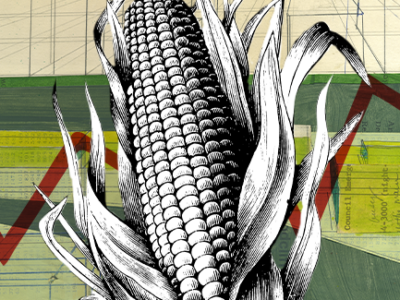In recent years, the price of gasoline has soared as the supply of crude oil has risen in response to unprecedented global demand. But never fear, Uncle Sam is here! Citing the need to decrease our country’s dependence on foreign and potentially unreliable sources of energy, Congress, encouraged by President Bush, has passed laws mandating that ever-greater quantities of corn-based ethanol (CBE) be produced, and subsidizing this production with tens of billions of dollars. Could it be that our leaders are finally demonstrating bipartisan unity for the good of the country? Well, “unity,” yes, “good,” no.
Subsidizing CBE has been an easy “sell.” The corn growers and ethanol producers love it, of course, and the American public likes the concept of a home-grown source for a renewable fuel. It’s a win-win situation, right? Oops, not exactly. When all the bills come due from the unintended consequences of this bipartisan exercise in central planning, we may rue the day that politicians jumped on the CBE bandwagon.
One of the elementary insights of economics is that human choices have both costs and benefits. If you buy that expensive car that makes your pulse race, then there are other purchases that you will have to do without. Even the super-rich, though they can afford anything money can buy, don’t have time to enjoy every possible indulgence, and so they have to prioritize their choices, paying for the enjoyment of some things by forgoing others. Benefits always have costs.
Expanding this analysis to the realm of politics, Ludwig von Mises, the great Austrian economist, demonstrated with airtight logic that government intervention designed to benefit certain members of society inevitably imposes costs on others. Those who are inconvenienced by intervention—especially because they have seen that government is willing and able to alter the free market that would exist in the absence of government intervention—will seek intervention that offsets the undesirable side-effects of the prior intervention. However, any new interventions will themselves generate new side-effects, new costs, on other citizens, and so the political process lurches clumsily but powerfully in the direction of ever-greater government control that, taken to its logical conclusion, leads us further down the path of socialism.
Let’s examine some of the side effects—the “costs”—of Uncle Sam’s CBE subsidies binge. By significantly increasing the demand for corn, the price of corn has risen significantly. That means that the prices of the wide range of products that have corn as an ingredient—from corn flakes to corn syrup—will tend to rise. Prices of corn-fed livestock will rise. Other farmers are reducing production of other crops in order to produce more corn. The resulting drop in supply of soybeans et al. naturally raises those prices.
There are also environmental consequences to increased corn production. Some scientists warn of accelerated depletion of topsoil and water tables as more land is brought into tillage.
There are international consequences to our CBE policy, too. Because of the massive diversion of corn to ethanol production, the supply of corn for human consumption in Mexico has dropped. Consequently, the cost of tortillas—the mainstay of the Mexican diet—has nearly tripled, inflicting hardship on millions of poor Mexicans. At a time when Congress is dealing with a massive problem of illegal immigration from south of the Rio Grande, this would only increase the incentives for Mexicans to come north.
Another international aspect of our government’s CBE policy involves Brazil. Brazil leads the world in producing ethanol from sugar cane—a far superior source of fuel than corn. However, instead of availing ourselves of this abundant, cheaper, immensely more efficient supply of ethanol, American tariffs keep Brazilian ethanol out of the United States, in deference to the domestic sugar and corn lobbies. We are losing a golden opportunity to forge closer ties with Brazil (an opportunity that China is seizing, signing multiple contracts to lock up Brazil’s abundant supplies of natural resources) and running the risk that Brazil, kept at arm’s length by the United States, may fall into the anti-American orbit of Venezuela’s Hugo Chavez.
It is possible that our tax dollars are buying more problems than they are solving. In fact, a debate is now heating up as to whether ethanol is a good investment at all, apart from its side-effects. Since huge amounts of nonrenewable fossil fuels are needed to produce, transport, and process corn into ethanol, and since a gallon of CBE has far less energy than a gallon of gasoline, resulting in fewer miles-per-gallon, it is possible (and a point currently being vigorously debated by scientists) that CBE may not achieve a net reduction in oil consumption—that the hoped-for energy savings are illusory.
With government economic planning having been thoroughly discredited by the spectacular failure of socialism not many years ago, one would think that our own government wouldn’t stray down that path, but would let the market determine what fuels are produced for our vehicles. Alas, hope triumphed over experience, and the result is an emerging CBE fiasco. Uncle Sam is making another mess of things, and he’s sticking you with the bill.




